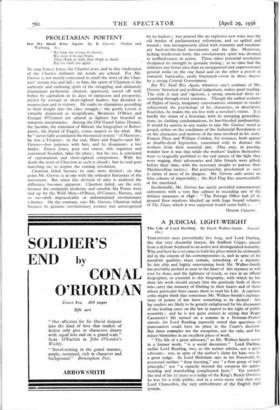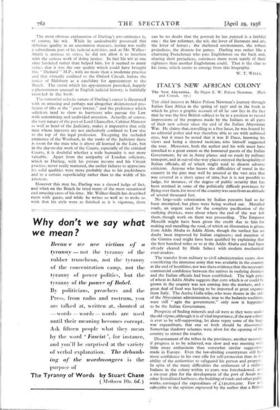A JUDICIAL LIGHT-WEIGHT
THREATENED men proverbially live long, and Lord Darling, like that very dissimilar lawyer, Sir Stafford Cripps, passed from a delicate boyhood to an active and distinguished maturity. Why and how he ever came to hold the place which he ultimately did in the esteem of his contemporaries is, and in spite of his manifold qualities must _ remain, something of a mystery. In this able and highly entertaining book Mr. Walker-Smith has probably probed as near to the heart of this mystery as will ever be done, and the lightness of touch, so rare in an official biographer, so essential to this biography, with which he has done his work should ensure him the gratitude both of those who carry the memory of Darling in their hearts and of those whose particular bent causes them to read his Life. A captious critic might think that sometimes Mr. Walker-Smith's explana- tions of points of law leave something to be desired : few lay readers are likely to be greatly enlightened by his discussion of the leading cases on the law in regard to the right of public assembly ; and he is not quite correct in saying that Roger Casement's life turned on a comma in a Norman-French statute, for Lord Reading expressly stated that questions of punctuation could have no place in the Court's decision. But these examples are the exception, not the rule, and but minor blemishes in an excellent piece of work.
"The life of a great advocate," as Mr. Walker-Smith wrote in a- former work, "is a social document." Lord Darling, unlike Lord Reading, was, as the author admits, not a great advocate ; nor, in spite of the author's claim for him, was he a great judge. As Lord Hailsham says in his Foreword, he possessed neither "deep learning," nor "a firm grasp of legal principle," nor "a capacity beyond the common for appre- hending and _marshalling complicated facts." Yet towards the end of his 27 years as a judge of the King's Bench Division he was for a wide public, and in a sense more vital than any Lord Chancellor, the very embodiment of the English legal
sysleni.
The most obvious explanation of Darling's pre-eminence is, of course, his wit. While he undoubtedly possessed this delicious quality in an uncommon measure, jesting was really a subordinate part of his judicial activities, and, as Mr. Walker- Smith is anxious to stress, he did not allow it to interfere with the serious work of doing justice. In fact his wit at one time hindered rather than helped him, for it seemed to many critics that it was the one quality which could have brought this " Diehard " M.P., with no more than a moderate practice and that virtually confined to the Oxford Circuit, before the notice of Halsbury as a candidate for appointment to the Bench. The storm which his appointment provoked, happily a phenomenon unusual in English judicial history, is faithfully recorded in the book.
The somewhat eclectic nature of Darling's career is illustrated with an amusing and perhaps not altogether disinterested pro- fusion of tilts at the "pure lawyer," and the preference which solicitors tend to show to barristers who pursue the Law with unremitting and undivided attention. Actually, of course, the very nature of the post of Lord Chancellor, Cabinet Minister as well as head of the Judiciary, makes it imperative that only men whose interests are not exclusively confined to Law rise to the top of the legal profession. Excepting the secluded eminence of the Woolsack, in the ranks of the Judiciary there is room for the man who is above all learned in the Law, but in the day-to-day work of the Courts, especially of the criminal Courts, it is doubtful whether a wide humanity is not more valuable. Apart from the antipathy of London solicitors, which to Darling, with his private income and his Circuit practice, never really mattered, the earlier failures to appreciate his solid qualities were more probably due to his puckislmess and to a certain superficiality rather than to the width of his interests.
However this may be, Darling was a shrewd judge of fact, . and when on the Bench he tried many of the most sensational and amusing cases of his time. Mr. Walker-Smith has described them with gusto, and while he writes so well as to make us wish that his style were as finished as it is vigorous, there can be no doubt that the portrait he has painted is a faithful one : the law reformer, the wit, the lover of literature and art, the lover of horses ; the sheltered environment, the robust prejudices, the distaste for games. Darling was rather like a charming Frenchman who pats Englishmen on the back and, sharing their prejudices, convinces them more surely of their rightness than another Englishman could. That is the clue to his fame, which seems to emerge from this biography.
W. T. WELLS.



























































 Previous page
Previous page